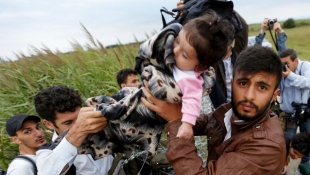Organised by the Portuguese Communist Party, an International Meeting was held in Lisbon, on 3-4 March under the slogan “Europe and the European Union, realities, struggle experiences and new opportunities for change” in which participated 23 communist parties and other left wing forces from European countries.
The meeting allowed for a useful exchange of information and opinions on the social and political situation of each represented country and for a rich exchange of views on the problems of Europe and the European Union and on the co-operation of the anti-capitalist left wing forces in an unstable international context with heavy threats but in which there are also strong mobilisations and significant progressive advances.
In the framework of a broad diversity of analyses and positions the participants considered that the dominating neo-liberal policies of increasing capital centralisation and concentration and the overall attack against labour and trade union rights is responsible for the serious social situation prevailing in the whole of Europe, with mass unemployment, generalised underpaid work without rights, increasing poverty and other social scourges. The attack on public services (health, education, retirement allowances and pensions) was particularly condemned with strong emphasis put in the struggle against the “Bolkestein directive”.
Great concern was expressed about the increasing restrictions to the citizens fundamental rights, freedoms and guarantees that have been taking place in numerous countries. With the pretext of the “war on terrorism” there have been several unacceptable “securitary derailments”. It is the case of frequent demonstrations of racism and xenophobia, banalizing and laundering fascism, revising history and anti-communism. A strong accent was put on the growing relevance of the struggle to defend democracy against all attempts that try to impoverish and decharacterise it. An alert was raised on the dangers of criminalising communists and their ideology (one of its expressions being the “anti-communist report” of the Parliamentary Assembly of the Council of Europe). The participants expressed their solidarity with the Communist Youth Union of Czech Republic and with the Communist Party of Bohemia and Moravia. It was demanded a full explanation concerning the CIA fascist-type operations in Europe.
In relation to the problems of co-operation and security in Europe and of the contribution of European countries for a new international order of peace, more equitable and just, the participants declared their firm opposition to the “bloc” politics that are increasingly developing; to NATO’s Eastern and Southern enlargement and its planetary projection; and to the militarization of the EU.
Great concern was expressed for the yielding of the European Union to the impositions of the USA and for its growing alignment with the Bush administration and its aggressive policy namely in relation to the Middle East and Central Asia, when what is required is autonomous policies geared for peace, disarmament and political resolution of conflicts.
The participants underlined the necessity of putting an end to the unfair relations that have prevailed between the large and the small countries, particularly in the context of the Eastern enlargement of both the EU and NATO in the Continent as well as in the Euro-Mediterranean area.
Among other questions the participants declared themselves in favour of reinstating the principles of the Helsinki Final Act and of considering the OSCE as a regional organisation of a democratised United Nations Organisation, in favour of NATO’s dissolution and of the withdrawal of foreign military basis on European soil, of the creation of a collective security system based on reciprocal advantages (economic, social, scientific and cultural) and not on the predominantly military factors and in favour of the necessity to, once again, put nuclear disarmament on the agenda.
While acknowledging diverse views and perspectives, the participants positively valued the multiple actions undertaken for an Europe of peace, progress and co-operation. In relation to the European Union, particular significance was attributed to the opposition to the so called “European Constitution” as well to the deep political meaning of the French and Dutch “No’s”. The participants underlined their common will of countering the manoeuvres of Germany’s and other countries ruling classes to impose the defeated “constitution” and their will to carry out the struggle against the neo-liberal, anti-democratic and militaristic contents of the process of European integration. The PCP’s intention to organise an international initiative in Portugal in the framework of the Portuguese EU presidency, deserved a favourable welcome.
The participants expressed their firm opposition to the policy of war led by the USA, in alliance with other major powers in Iraq, in Afghanistan and the Middle East and in Central Asia, and demanded the withdrawal of the foreign occupying forces as well as the end of the threat of aggression against sovereign countries like Syria and Iran. They underlined the importance of demilitarising the Mediterranean and transforming it into an area of peace and co-operation. They expressed their solidarity with the peoples who struggle for their liberation, particularly to the Palestinian people, demanding the full respect of their national rights and the enforcement of the UN resolutions on Palestine, as well as to the people of Cyprus for the end of the occupation and for the reunification of their country. They alerted to the dangers of instigating racism and xenophobia and to the attempts to transform the “cartoon crisis” into a “war of civilisations” with the aim of increasing tension and justifying for new military adventures.
Numerous suggestions were made on common or converging initiatives of Europe’s anti-capitalist left wing forces as well as of trade union and social movements and of, in simultaneous with the development of actions of the masses, articulating their intervention in international institutions where they are represented, notably in the Parliamentary Assembly of the Council of Europe and in the European Parliament.

